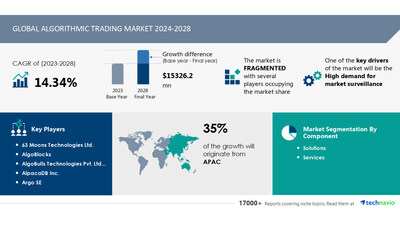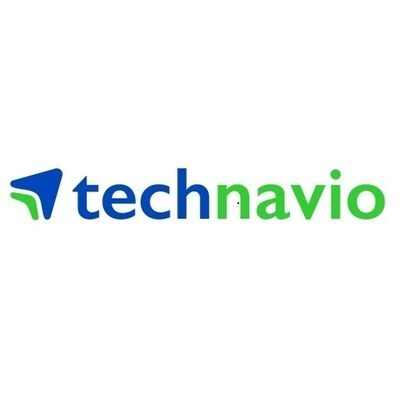The algorithmic trading market is projected to grow by USD 15.33 billion from 2024 to 2028, driven by rising demand for AI-powered market surveillance- Technavio
Press Releases
Sep 06, 2024
NEW YORK, Sept. 6, 2024 /PRNewswire/ — Report on how AI is driving market transformation- The global algorithmic trading market size is estimated to grow by USD 15.32 billion from 2024-2028, according to Technavio. The market is estimated to grow at a CAGR of 14.34% during the forecast period. High demand for market surveillance is driving market growth, with a trend towards technological advancements. However, wider bid-ask spread in APAC poses a challenge. Key market players include 63 Moons Technologies Ltd., AlgoBlocks, AlgoBulls Technologies Pvt. Ltd., AlpacaDB Inc., Argo SE, Auros, CRYPTO TECHFIN SL, InfoReach Inc., iRageCapital Advisory Pvt. Ltd., MetaQuotes Ltd., QuantConnect Corp., QuantCore Capital Management LLC, Refinitiv, Software AG, Symphony Fintech Solutions Pvt. Ltd., Tata Consultancy Services Ltd., Thomson Reuters Corp., uTrade, Virtu Financial Inc., and Wyden AG.
Key insights into market evolution with AI-powered analysis. Explore trends, segmentation, and growth drivers- View the snapshot of this report
|
Algorithmic Trading Market Scope |
|
|
Report Coverage |
Details |
|
Base year |
2023 |
|
Historic period |
2018 – 2022 |
|
Forecast period |
2024-2028 |
|
Growth momentum & CAGR |
Accelerate at a CAGR of 14.34% |
|
Market growth 2024-2028 |
USD 15326.2 million |
|
Market structure |
Fragmented |
|
YoY growth 2022-2023 (%) |
12.7 |
|
Regional analysis |
North America, APAC, Europe, South America, and Middle East and Africa |
|
Performing market contribution |
APAC at 35% |
|
Key countries |
US, China, UK, Japan, and Germany |
|
Key companies profiled |
63 Moons Technologies Ltd., AlgoBlocks, AlgoBulls Technologies Pvt. Ltd., AlpacaDB Inc., Argo SE, Auros, CRYPTO TECHFIN SL, InfoReach Inc., iRageCapital Advisory Pvt. Ltd., MetaQuotes Ltd., QuantConnect Corp., QuantCore Capital Management LLC, Refinitiv, Software AG, Symphony Fintech Solutions Pvt. Ltd., Tata Consultancy Services Ltd., Thomson Reuters Corp., uTrade, Virtu Financial Inc., and Wyden AG |
Market Driver
The introduction of advanced electronic trading technologies has significantly benefited both vendors and customers in the Algorithmic Trading Market. Liquidity aggregation and algorithmic trading across various geographies have expanded market access for participants, reducing risk sharing and resulting in lower trading costs and faster execution times. This has contributed to an increase in FX turnover. New liquidity aggregation methods, such as linking multiple investor pools through algorithms, have reduced search costs, a key feature of the OTC market. Financial institutions are prioritizing transparency in collateral availability, focusing on efficient decision-making and risk reduction in collateral transactions. They plan to invest heavily in collateral management during the forecast period, focusing on optimization, cheapest-to-deliver algorithms, and risk management, aiming to maximize profits and drive market growth.
Algorithmic trading, also known as Algo trading, is the use of computer programs and mathematical algorithms to make trades in financial markets based on predefined rules. This automated approach is popular among hedge funds, institutional investors, pension funds, mutual funds, and other financial institutions. Algo trading involves the use of complex mathematical models to identify trends and make trades in stocks, bonds, currencies, commodities, and even cryptocurrencies. The trend towards algorithmic trading is driven by the need for speed and efficiency, as well as the desire to minimize human error. Algo trading platforms and professional services offer cloud-based deployment, making it accessible to large enterprises and capital markets firms. However, the use of black box trading and artificial intelligence (AI) raises concerns around market transparency, accountability, and market integrity. Risk management is a key consideration in algorithmic trading, particularly in volatile markets. Market volatility and price fluctuations can impact the performance of financial service algorithms, making risk management an essential component of any Algo trading strategy. Additionally, the use of cloud technologies and cloud-based trading solutions offers business agility and improved liquidity. Despite the benefits, there are challenges associated with Algo trading, including the risk of flash crashes and the need for risk management systems. As the trend towards automation continues, it is essential that market participants prioritize market transparency, accountability, and market integrity to ensure the long-term sustainability of financial markets.
Request Sample of our comprehensive report now to stay ahead in the AI-driven market evolution!
Market Challenges
- The algorithmic trading market in Asia Pacific (APAC) encounters challenges due to wider bid-ask spreads in various stocks. For instance, the average dealing spread in Singapore’s stocks is approximately 0.75%. Although market liquidity can be substantial, large spreads make trading difficult. Some stocks with high volatility and low turnover pose additional challenges for algorithmic trading. Nevertheless, industry players in APAC are exploring ways to replicate the success of algorithms in the US and Europe. The algorithmic trading market in APAC is still in its initial stages. Countries like China, Japan, Hong Kong, Singapore, and South Korea are leading the way. However, local players in APAC lag behind their counterparts in the Americas and Europe in terms of algorithmic trading strategies. This disparity is anticipated to impede the growth of the market in the forecast period.
- Algorithmic trading, also known as automated trading, is a method used by institutions and individuals to execute trades faster and more efficiently in the stock market and cryptocurrency market. However, it comes with challenges. Market volatility and price fluctuations can make it difficult for algorithms to make accurate predictions. Market transparency is essential for accountability, but maintaining it can be challenging. Speed and efficiency are key, but ensuring market integrity and preventing flash crashes requires careful consideration. Algorithmic trading platforms and professional services offer solutions, including cloud-based deployment for business agility and accessibility. Large enterprises, institutional investors, pension funds, and mutual funds use these tools. AI and financial service algorithms power automated trading, while matching engines ensure liquidity. Cloud technologies enable automated trading, including cloud-based solutions and hybrid cloud deployments. Blockchain adds security and transparency. Acquisitions and partnerships drive innovation, with workflow solutions, covert execution algorithms, and digital onboarding solutions among the offerings. Automated trading bots, volume, price, and time are essential factors. DoubleVerify ensures accuracy and reliability, while ensuring market integrity remains a top priority.
Discover how AI is revolutionizing market trends- Get your access now!
Segment Overview
This algorithmic trading market report extensively covers market segmentation by
- Component
- 1.1 Solutions
- 1.2 Services
- End-user
- 2.1 Institutional investors
- 2.2 Retail investors
- 2.3 Long-term investors
- 2.4 Short-term investors
- Geography
- 3.1 North America
- 3.2 APAC
- 3.3 Europe
- 3.4 South America
- 3.5 Middle East and Africa
1.1 Solutions- Algorithmic trading is a method of executing trades automatically based on predefined instructions. It uses complex mathematical models and algorithms to identify trading opportunities and execute trades at optimal prices. This automated approach allows for faster and more accurate trade executions, reducing human error and enhancing overall efficiency in financial markets. Algorithmic trading systems analyze market data in real-time and execute trades based on specific market conditions, providing an edge to traders in today’s fast-paced financial markets.
Download a Sample of our comprehensive report today to discover how AI-driven innovations are reshaping competitive dynamics
Research Analysis
Algorithmic trading, also known as Algo trading, is the use of computer programs and mathematical algorithms to make trades in financial markets based on predefined rules. This automated approach to trading has become increasingly popular in various markets, including stocks, bonds, currencies, commodities, cryptocurrencies, and more. Algorithmic trading allows for faster execution, reduced human error, and the ability to process vast amounts of data in real-time. However, it also presents challenges such as market volatility, price fluctuations, and the need for risk management. Institutional investors, hedge funds, pension funds, mutual funds, and other financial entities use algorithmic trading to gain an edge in the markets. The use of artificial intelligence (AI) and financial service algorithms, as well as cloud-based solutions, is also becoming more prevalent in this field. Despite its benefits, algorithmic trading requires careful design, testing, and monitoring to ensure optimal performance and minimize potential risks.
Market Research Overview
Algorithmic trading, also known as Algo trading, is the use of computer programs and mathematical algorithms to make trades in financial markets based on predefined rules. This automated approach to trading is utilized in various markets, including stocks, bonds, currencies, commodities, and even cryptocurrencies. Algo trading offers several advantages such as speed, efficiency, accessibility, and reduced human error. However, it also presents challenges like market volatility, price fluctuations, and market transparency. Risk management is crucial in Algo trading, as large financial institutions, hedge funds, pension funds, mutual funds, and other institutional investors increasingly rely on this method for executing trades. Algorithmic trading platforms and professional services provide essential tools for these entities, offering cloud-based deployment, automated trading, matching engines, and other advanced features. Cloud technologies, artificial intelligence (AI), and financial service algorithms are driving the evolution of Algo trading, enabling business agility and improved market integrity. However, concerns over market transparency, accountability, and potential flash crashes continue to be addressed through regulatory measures and technological advancements. Key components of Algo trading include automated trading bots, volume, price, time, and various workflow solutions. As the market continues to evolve, we can expect further acquisitions, innovations, and advancements in this area.
Table of Contents:
1 Executive Summary
2 Market Landscape
3 Market Sizing
4 Historic Market Size
5 Five Forces Analysis
6 Market Segmentation
- Component
- Solutions
- Services
- End-user
- Institutional Investors
- Retail Investors
- Long-term Investors
- Short-term Investors
- Geography
- North America
- APAC
- Europe
- South America
- Middle East And Africa
7 Customer Landscape
8 Geographic Landscape
9 Drivers, Challenges, and Trends
10 Company Landscape
11 Company Analysis
12 Appendix
About Technavio
Technavio is a leading global technology research and advisory company. Their research and analysis focuses on emerging market trends and provides actionable insights to help businesses identify market opportunities and develop effective strategies to optimize their market positions.
With over 500 specialized analysts, Technavio’s report library consists of more than 17,000 reports and counting, covering 800 technologies, spanning across 50 countries. Their client base consists of enterprises of all sizes, including more than 100 Fortune 500 companies. This growing client base relies on Technavio’s comprehensive coverage, extensive research, and actionable market insights to identify opportunities in existing and potential markets and assess their competitive positions within changing market scenarios.
Contacts
Technavio Research
Jesse Maida
Media & Marketing Executive
US: +1 844 364 1100
UK: +44 203 893 3200
Email: [email protected]
Website: www.technavio.com/
![]() View original content to download multimedia:https://www.prnewswire.com/news-releases/the-algorithmic-trading-market-is-projected-to-grow-by-usd-15-33-billion-from-2024-to-2028–driven-by-rising-demand-for-ai-powered-market-surveillance–technavio-302240503.html
View original content to download multimedia:https://www.prnewswire.com/news-releases/the-algorithmic-trading-market-is-projected-to-grow-by-usd-15-33-billion-from-2024-to-2028–driven-by-rising-demand-for-ai-powered-market-surveillance–technavio-302240503.html
SOURCE Technavio



